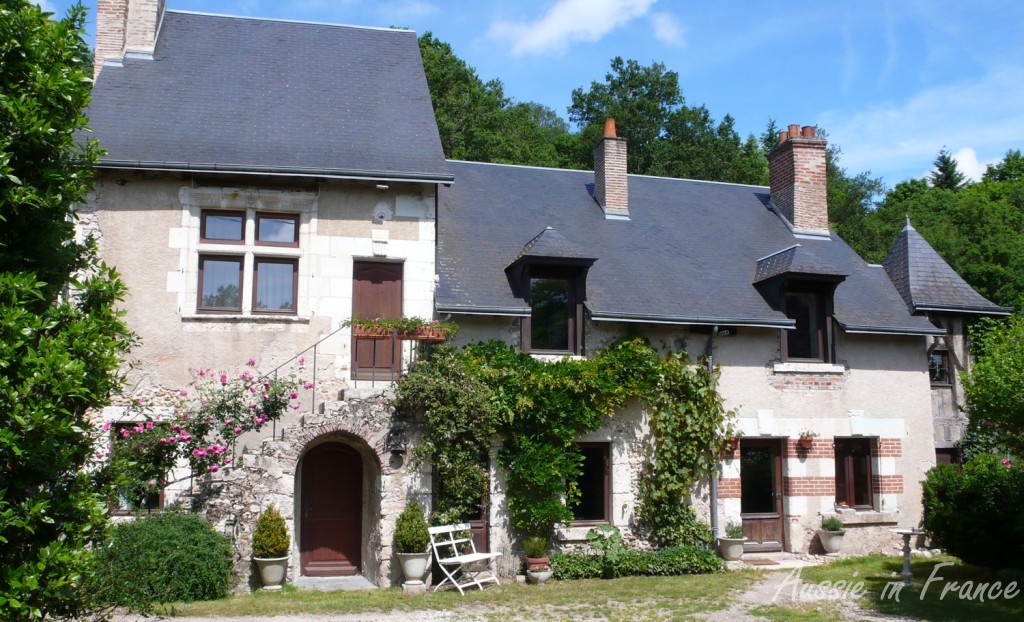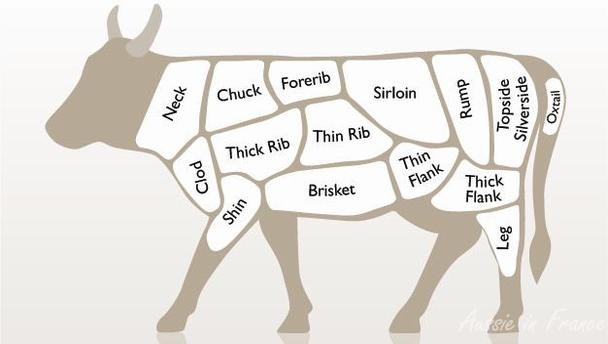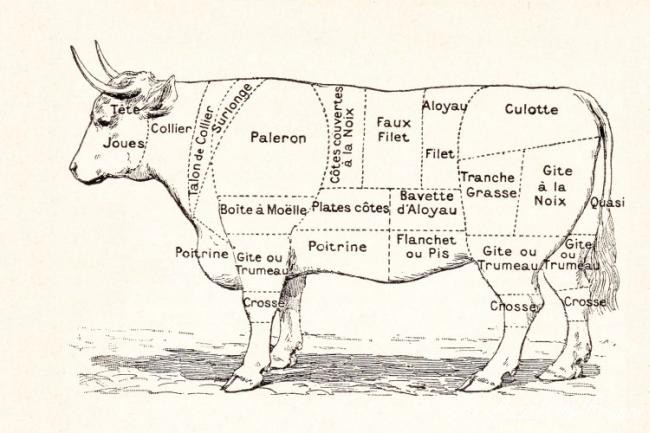Even French people confuse gîte and chambre d’hôte. I know this for certain because when I tell people I have a gîte they often start talking about le petit déjeuner which, of course, is only served in a B&B.

Before it came to mean a self-catering cottage in the country, gîte, which comes from the verb gésir, derived from the Latin jacere (to lie down), meant any place to sleep either permanently or temporarily.
Offrir le gîte et le couvert, for example, means to offer board and lodging.
A gîte, I have just learnt, is also a resting place for hares. Ten points to anyone who knows the equivalent in English! I certainly didn’t. “Hares do not bear their young below ground in a burrow as do other leporids, but rather in a shallow depression or flattened nest of grass called a form. All rabbits (except the cottontail rabbits) live underground in burrows or warrens, while hares (and cottontail rabbits) live in simple nests above the ground, and usually do not live in groups.” Thank you Wikipedia. And thank you Susan from Days in the Claise who has posted a photo of a form.
A mineral deposit is also called a gîte, as in gîte de zinc but an oil deposit is a gisement de pétrole. And pétrole is not petrol as we say in Australia for gasoline – you fill your car with essence in France. Pétrole means oil or petroleum. Diesel engines take gas-oil or gazole (pronounced gaz-well, don’t ask me why!)
Gîte (short for gîte à la noix) is also a cut of beef corresponding more or less to what we call topside (UK) or bottom round (US). French and English butchers don’t cut up beef in the same way so quite often there is no real equivalent (entrecôte, côte de boeuf, T-bone, etc.), as you can see from the drawings. You can read more on the subject in Posted in Paris.
Another expression with the verb gésir is Ici gît le roi d’Espagne (here lies the King of Spain). Other examples are: un trésor qui gît au fond des mers = A treasure lying on the bottom of the sea and ses vêtements gisaient sur le sol, a somewhat literary way of saying that his clothes were strewn all over the floor.
So now you know the difference between a gîte and a chambre d’hôte – and a lot more useful things besides!



I have stayed in a gite Ribeauville. It was just wonderful, so beautiful and charming. A gite is distinguished by the official rooster signage according to my sister who is well traveled in country. Thanks for your enjoyable post.
Hi Susan and thank you for commenting. I’m glad you enjoyed the post. I’m not familiar with the official rooster signage. There is a very big organisation called Gîtes de France but its logo is a map of France with an open window and house inside. You don’t have to belong to it (I chose not to because my guests are not usually French).
Un terrier is sometimes referred to as un gîte, so many animals that lives underground, such as badgers and foxes, live in gîtes. In English you would say earth, den, lair or sett, depending on the animal. Curiously, French rabbits don’t seem to be described as living in gîtes, they live in garennes (warrens).
I heard a story once that gîtes in the sense of holiday accommodation became known so as a result of the number of people in the 20thC who converted their pigsties into holiday accommodation. and pigsties (or animal shelters in general) were referred to as gîtes. I can find no evidence that this story is true though.
Thanks for the comparative diagrams of cuts of beef — very useful indeed.
I had heard of terrier but not gîte. The Larousse definition is “Emplacement où le lièvre se repose le jour; lieu où s’abrite le gibier: tanière, terrier.”
Most of the pigsties I’ve seen (we have one) are too small to have been converted into holiday accommodation so I think it’s probably just hearsay!
I love your little trips around the french… language.
You know quite a lot, and obviously being French I love it!
– There is another meaning to gite (or gîte) “le bateau gite” : the boat is listing -to one side-
so “giter” is linked to “roulis” (rolling). The “other” motion of a boat being “tanguer”, “le tanguage”(pitching).
– About “une garenne”… this is not strictly speaking a place (like a den or a burow are) it’s an piece of ground like a warren is. (have you noticed how warren and garenne sound very close they might have a common root…)
– Essence comes from “essence de pétrole”… As oil (petrol) is distilled the result is (correct me if I’m wrong) an essence.
– pétrole: In english you have the world “petroleum” not far!
http://www.oxforddictionaries.com/definition/english/petroleum
– Pronunciation for gasoil. In France these days you will find many words for Diesel (gazole/gas-oil/gasoil/Diesel) but gasoil was and still is quite used (see picture in the hyperlink below)
Well to a frenchman an ‘s’ between two vowels is pronounced Z (like in raiSon, saiSon, etc.) so this ‘s’ in gaSoil has to be a “z”… and oil is pronounced ‘oual’ like in pOIL (hair), vOILe (sail), tOILe (canvas).
so the result is ga-zoil. No mystery here….
http://www.lefigaro.fr/medias/2012/02/01/e5967274-4cfe-11e1-bb43-47f97d394d3c.jpg
I wish you all a nice oui-keind ! 🙂
Hi Ago,
Thank you. I had forgotten the marine meanings of gîte. I don’t know if you read Susan’s answer and my reply giving the Larousse definition of gîte for hares which corresponds to your explanation that a gîte is a “piece of ground” rather than a burrow. Warren and garenne probably do have the same origin. I don’t have my etymological dictionaries with me in Blois (they are in Paris) so I’ll check next time I am there but the vocalisation of “g” often gives “w” in English.
The funny thing about gas-oil is that we don’t use it in English! But there are lots of other examples such as the footing that I first heard people use for “jogging” when I came to France. It seems to have died out now ..
I studied Romance linguistics many moons ago and have always been interested in etymology. My 38 years as a professional translator and my 15 years of teaching translation and terminology at ESIT have also given me lots of experience in the field as you can well imagine!
I’m sure ‘warren’ comes from ‘garenne’. Rabbits are not native to Britain. The Romans introduced them, but they did not thrive without constant attention. The Normans (who are widely believed to have introduced them to Britain, but this is not the case) employed warreners to cosset them so there was always rabbits for the table. It took centuries for rabbits to establish themselves in Britain as a wild animal, and warreners on big estates would have been essential up until about the 18th C I would say, and you still find a few in the 19th C.
Goodness, I’m so surprised about rabbits not being native to Britain particularly when you consider how quickly they multiplied in Australia. Very interesting.
Lack of predators was the main reason they were able to breed up so rapidly in Australia initially.
Hi Rosemary
There are many “english” words that we use and you don’t indeed.
Parking for carpark
nurse for nanny
smoking for dinner jacket (american “tuxedo”)
break for estate car (american “station wagon”)
.. I always have a big laugh thinking of a frenchmen asking a Car Dealer “can you give me a break please?”
The “break” stuff puzzled me a lot, and for a long time… I found out that a long time ago there was a carriage called a break in english…
It can also be spelled brake and is found in modern english in “shooting brake” amazingly translated to the french “break de chasse”….
A lot of words are “half-right” such as parking = parking lot, nurse = wet nurse (that is, a woman who breastfed the baby instead of the mother), smoking = smoking jacket, self = self-service, etc. I knew the term “shooting brake” from reading period novels but didn’t realise it had produced “break” in French – and “break de chasse” is just too funny! Worth a post on its own!
How interesting! I didn’t realize that Gite was also a cut of beef but I was aware we butchered differently. Do you by chance know why? I think it is so weird that this particular trade didn’t cross the channel as so many others did. All I know is that without my Julia Child diagram in my cookbook I would be very confused! 🙂
As I posted on Susan’s Daysontheclaise:
Gîte, when it is a feminine noun, means bank angle. So there is a difference between le gîte et la gîte.
Hi, yes, thank you for your comment. La gîte is the bank angle which speaking of an aircraft. Otherwise, it’s the list of a ship or the bed of a stranded vessel. Same origin though (gésir).